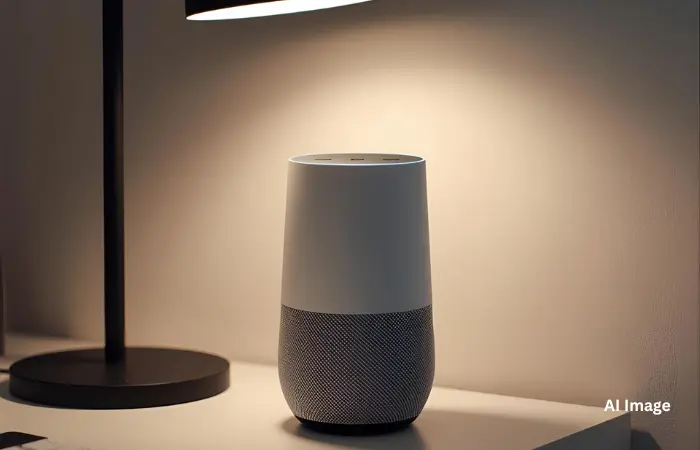There’s a strange moment of intimacy when you lower your voice to speak to a smart speaker. Maybe it’s late at night, and you don’t want to wake your partner. Maybe you’re whispering a private question you’d rather no one else hear. Either way, you lean in, murmur the command and the speaker answers, almost like it heard you more attentively than usual.
That raises a provocative question: if you whisper to your smart speaker, is it actually listening closer? The answer is partly technical, partly psychological, and partly unsettling.
The Basics of Smart Speaker Listening
To understand what happens when you whisper, you first need to know how smart speakers listen in the first place
Smart speakers like Amazon Echo, Google Nest, and Apple HomePod are equipped with arrays of microphones. These aren’t ordinary microphones; they use beamforming, a process that allows them to focus on sound coming from one direction while minimizing background noise. This is why a device can hear you say “Hey Siri” even over the sound of music or chatter.
When you whisper, the device has to work harder: your voice is softer, lower in amplitude, and often lacks the clear high-frequency sounds that normal speech carries. But modern smart speakers are trained to handle exactly this challenge. They’ve been fed thousands of hours of speech data including recordings of people whispering to make sure they respond reliably in all conditions.
Whisper Mode: More Than Just a Gimmick
Amazon, in particular, has leaned into the whispering dynamic. The Echo has a Whisper Mode, where if you whisper to Alexa, it will whisper back. Technically, this involves a paralinguistic detection system a way of identifying not just what you said, but how you said it.
Detecting a whisper isn’t trivial. The software analyzes the sound’s frequency distribution and amplitude. A whisper tends to have weaker vocal cord vibration, resulting in a “breathy” noise pattern. When the system detects this, it switches modes, lowering its own response volume.
This feature is practical useful when you want to set an alarm without waking the baby but it also highlights something deeper: your smart speaker isn’t just passively listening to what you say. It’s analyzing how you say it.
Is It Listening Closer?
So does whispering make your smart speaker “listen closer”? In a sense, yes. Here’s why:
- Signal Sensitivity
When your voice drops in volume, the microphones adjust gain (sensitivity) to pick up faint signals. It’s similar to how your ears perk up when someone whispers you naturally strain to listen.
- Context Awareness
Whisper detection requires the system to analyze vocal subtleties, not just words. That means your device is engaging in a more nuanced analysis of your speech patterns.
- Personalization
Over time, smart speakers adapt to your voice. If you often whisper late at night, the system may become better at anticipating and understanding those whispered commands.
In short, the quieter you speak, the more actively the device has to process your input. It may not be “listening closer” in a human sense, but the computational effort ramps up.
The Psychological Side
Part of the magic here isn’t in the device, but in us. Whispering feels secretive, vulnerable, intimate. When Alexa whispers back, it almost feels like a private exchange, like sharing a secret with a confidant.
That illusion is powerful. We tend to anthropomorphize machines, projecting human qualities onto them. A whispering speaker doesn’t just sound quieter it feels like it’s colluding with us, conspiring to keep things hush-hush.
This can be comforting, but it also masks the reality: your whisper is being processed, analyzed, and potentially stored like any other voice command. Whispering doesn’t make your request more private. If anything, it may signal to the system that this interaction is emotionally charged valuable data for companies building profiles of user behavior.
The Privacy Angle
And here’s where things get complicated. Smart speakers are always listening for their “wake word” (like “Alexa” or “Hey Google”). While companies insist they don’t record conversations until after the wake word, numerous reports have shown accidental activations, snippets of private conversation being captured, and even human reviewers listening to recordings for quality control.
So when you whisper, you might feel safer, but the system’s listening isn’t actually more discreet. If anything, whisper detection requires more sensitive audio processing which could, in theory, capture background sounds you weren’t aware of.
In other words: whispering feels private, but the technology behind it is anything but.
Why It Matters
The fact that smart speakers can detect and respond to whispering is both a triumph of engineering and a reminder of just how deeply these devices are designed to monitor us. They’re not just parsing words; they’re interpreting tone, emotion, and intention.
This blurs the line between tool and companion. When you whisper to a smart speaker, it creates an illusion of intimacy. But behind the curtain, what’s happening is data processing, not empathy.
Final Thoughts
So, if you whisper to your smart speaker, is it listening closer? Technically, yes it adjusts its sensitivity, ramps up its analysis, and leans harder into detecting your intent. Psychologically, it feels closer too, creating a false sense of intimacy. But in terms of privacy, whispering doesn’t shield you at all.
In fact, the act of whispering might be the most revealing interaction of all not because the device understands your secrets, but because it shows how easily we slip into treating machines as confidants.
Perhaps the more interesting question isn’t whether smart speakers listen closer when we whisper, but whether we should.





